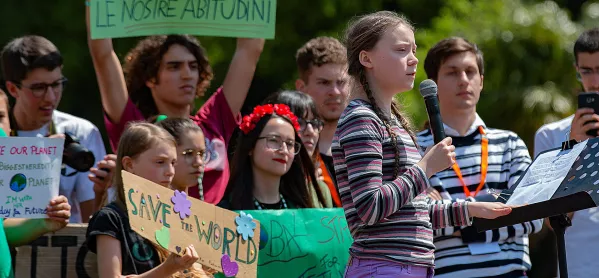- Home
- How to help students ‘channel outrage’ about the world
How to help students ‘channel outrage’ about the world

These are “dark times”, says Hilary Janks, professor emerita in the School of Education at the University of the Witwatersrand in Johannesburg, South Africa. The right wing is on the rise, democracy is under threat and the planet is at risk, she says.
But young people give her hope, namely 16-year-old Swedish climate activist, Greta Thunberg, and the students from Marjory Stoneman Douglas High in Parkland, Florida, who took on the US government over gun laws after 17 of their peers were killed last year.
But these passionate and eloquent students did not just instinctively know how to channel their outrage - rather, they were a product of their schooling, argues Janks, who worked at University of the Witwatersrand for over 35 years in teacher education.
Climate change: Greta Thunberg proves just how capable autistic children are
WATCH: Florida school shooting survivor on ensuring that every child is safe to go to school
Teaching in the Trump era: All we can do is challenge hate
Quick read: Teachers are ‘single greatest obstacle’ to populism
Video: Thousands join climate strikes around Scotland
Janks - who delivered a public lecture at the University of Strathclyde in Glasgow earlier this month - looked at the curriculum studied by students at Marjory Stoneman Douglas High, after becoming curious about where “these articulate, forceful young people” had come from. She found it included debating, drama, journalism and civic education, which Janks argues “prepared these students for political activism long before the trauma of seeing their friends shot”.
“They did not just come out the woodwork because there was a trauma; they had been educated to take on these roles,” she says, in an interview with Tes Scotland.
Teaching critical literacy
The drama and debating gave them their confidence and eloquence, explains Janks, and the journalism meant they were able to harness social media and get their message out there.
This is why Janks is passionate about the teaching of critical literacy, which is her own area of expertise, but one that she feels is neglected in schools.
There is no such thing as a neutral text, she says, and children - especially in the age of social media - need to be taught to see how a text is positioned “whose interests does it serve, who is marginalised, who is included” and then apply their values in order to decide whether or not they agree with it.
One of the texts she uses in her lecture states: “My grandmother was not a highly educated woman, but she told me as a child to quit feeding stray animals. You know why? Because they breed.”
She asks what the grandmother believes, whether the speaker agrees or not and then asks, do you agree or not? Then she reveals the quote came from André Bauer, a former lieutenant governor of South Carolina. It featured in Time magazine and he was criticising policies that extended welfare benefits to the poor.
The purpose, of course, is to show that context matters.
Challenging students’ beliefs
But schools generally are not doing a good job of teaching children to interrogate texts in this way, says Janks, with research from Stanford University showing that young people have trouble judging the credibility of information online. The researchers found young and otherwise digital-savvy students were duped by sponsored content and did not always recognise political bias of social messages.
Janks adds: “We need to give students the tools for deconstruction then get them to answer a whole range of critical questions - who is marginalised? Who is included? Who is excluded? Is this just? Is it fair? Those last two questions move from consideration of the text to questions of morality and I think that is also the responsibility of teachers.“
She acknowledges this can be hard for teachers, especially in countries such as the US, where pupils can come from “very divided communities and different positions”. However, she argues that educators have a duty to challenge their students’ beliefs.
“How you negotiate that in class requires a lot of skill and I think a lot of teachers shy away from it because they don’t want to deal with conflict but conflict and hearing the other point of view is part of what it is to live in a democracy - we have to be able to talk across our differences.”
In Janks’ view, if we never interrogate texts we never consider if they are “producing greater equity or injustices”; we never confront “the construction of difference that sets us against one another nor question the norms that govern our lives”. And we “never have to examine our own privileges or wonder about the lives of people excluded from opportunity and access to running water, health care and education”.
“There’s an increasing isolationism, in ‘my country first’, in keeping migrants out, the right wing is on the rise everywhere, and this kind of reading from an ethical position is really important,” she says.
She adds: “If you have got right-wing policies it becomes hard for teachers to do this kind of work in schools - but we found ways of doing it during apartheid, so I’m not too keen on excuses.”
Register with Tes and you can read two free articles every month plus you'll have access to our range of award-winning newsletters.
Keep reading with our special offer!
You’ve reached your limit of free articles this month.
- Unlimited access to all Tes magazine content
- Save your favourite articles and gift them to your colleagues
- Exclusive subscriber-only stories
- Over 200,000 archived articles
- Unlimited access to all Tes magazine content
- Save your favourite articles and gift them to your colleagues
- Exclusive subscriber-only stories
- Over 200,000 archived articles



